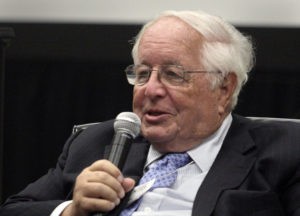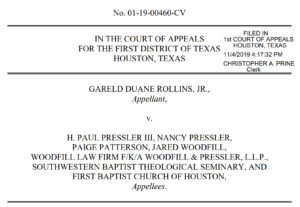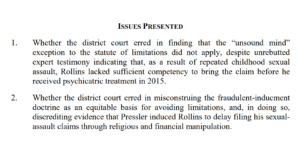Long-time Southern Baptist lay leader Paul Pressler used religion to sexually abuse a boy in the 1980s, and when that no longer worked began paying him as an adult to keep their relationship a secret, according to a new petition in the Texas Court of Appeals.
A brief filed Nov. 4 in the 1st District Court of Appeals in Houston claims that a district judge wrongly dismissed a lawsuit last year against retired appellate judge Paul Presser due to statute of limitations.

Judge Paul Pressler discusses the 1979 launch of the ‘Conservative Resurgence’ during the Southern Baptist Convention in 2013. (SBC press room photo by Heather Pendergraft)
Lawyers representing Gareld Duane Rollins say the lower court ignored expert testimony that their client was mentally unfit to sue for sexual assault until 2015, when with psychiatric help he finally confronted repressed memories of sexual assault in an “outcry” statement while serving time in prison.
Attorneys from Baker Botts LLP, a Houston-based international law firm recognized as one of America’s top law firms, say that Harris County District Judge R.K. Sandhill instead relied exclusively on a confidential settlement between Pressler and Rollins stemming from an altercation in a Dallas hotel room in November 2003.
The lawsuit settled in 2004 was over simple assault, lawyers say, but Pressler regarded the $1,500 per month he agreed to pay Rollins as money to buy his silence about three decades of sexual abuse.
“The evidence thus points to a multi-pronged approach to ensuring Rollins’ silence through religious pressure and financial payoffs,” according to the appellant brief.
The brief alleges that in the public eye, Pressler was viewed as a “giant” in the Southern Baptist Convention and a pillar of his community when Rollins first met him in the late 1970s. Privately, however, Pressler “took advantage of his social and religious status to prey on young men in his orbit,” the brief contends.
 Rollins, 55, claims that after he enrolled in Pressler’s Bible study at First Baptist Church in Houston, Pressler lured the devout and impressionable 14-year-old to Pressler’s home and a private club for fondling and anal sex. He convinced Rollins to keep “our secret,” the brief says, by telling the boy he was “special” and “no one but God would understand” their relationship.
Rollins, 55, claims that after he enrolled in Pressler’s Bible study at First Baptist Church in Houston, Pressler lured the devout and impressionable 14-year-old to Pressler’s home and a private club for fondling and anal sex. He convinced Rollins to keep “our secret,” the brief says, by telling the boy he was “special” and “no one but God would understand” their relationship.
The pattern continued throughout his high school years, he says, sometimes as often as two or three times a month. Rollins turned to drugs and alcohol to cope with the mental stress, typically triggered by contact with Pressler.
By college age Rollins was a full-blown addict with habits financed by a life of petty crime. Pressler stayed in contact with Rollins while he was in prison and twice intervened with the parole board seeking his release. The second time Pressler offered Rollins a job as a personal assistant and invited him to come along for a religious pilgrimage overseas paid for by Pressler.
An incident between the two while staying at a hotel in Dallas prompted Rollins to file a civil claim for simple or ordinary assault. Under the agreement, Pressler agreed to pay Rollins $1,500 a month as “long as the confidentiality of this agreement is maintained.”
Rollins returned to drinking and drugs, eventually winding up with a six-year prison sentence. While incarcerated and going through mental-health screening, the brief says, “Rollins realized, for the first time in his life, that his relationship with Pressler was neither ‘God-approved’ nor part of any ‘divine plan.’”
 “In short, Pressler used his position as a religious authority to seduce a young, religiously impressionable boy, that the seduction was God-approved, and throughout the long relationship that God’s Plan was in control of the whole sordid affair,” psychiatrist Dr. Harvey A. Rosenstock said in expert testimony contending that Rollins was of “unsound mind” regarding the abuse claim during a “period of incapacity” between 1980 and 2015.
“In short, Pressler used his position as a religious authority to seduce a young, religiously impressionable boy, that the seduction was God-approved, and throughout the long relationship that God’s Plan was in control of the whole sordid affair,” psychiatrist Dr. Harvey A. Rosenstock said in expert testimony contending that Rollins was of “unsound mind” regarding the abuse claim during a “period of incapacity” between 1980 and 2015.
Rollins “acted diligently and filed the instant lawsuit following his release from incarceration,” the brief claims, thus tolling a five-year statute of limitations.
“But rather than engage with the evidence of Rollins’s psychological state — the evidence most pertinent to the ‘unsound mind’ exception — the trial court obsessed over a 2004 lawsuit and settlement for simple assault that Rollins brought against Pressler,” the brief argues. “It apparently considered that lawsuit more probative of Rollins’s mental state than Dr. Rosenstock’s expert testimony.”
The appeal argues that an “unsound mind” exception to the statute of limitations in Texas law should be interpreted to allow Rollins to sue for sexual abuse that he was unaware of prior to 2015.
It accuses Pressler of fraudulently inducing Rollins not to bring claims prior to his 2015 outcry “through religious manipulation and financial payoffs.”
The brief asks the court of appeals to reverse the granting of summary judgment based on the statute of limitations issue and return the case to the trial court for further proceedings.
Previous stories:
Judge dismisses 5 of 8 claims in Pressler lawsuit, citing statutes of limitations
Lawyer who is suing prominent SBC leaders describes ‘Vatican light’ system for enabling abuse
Pressler claims statute of limitations defense; his accuser adds slander claim
Pressler abuse lawsuit turns attention to confidential settlement of earlier case in 2004
